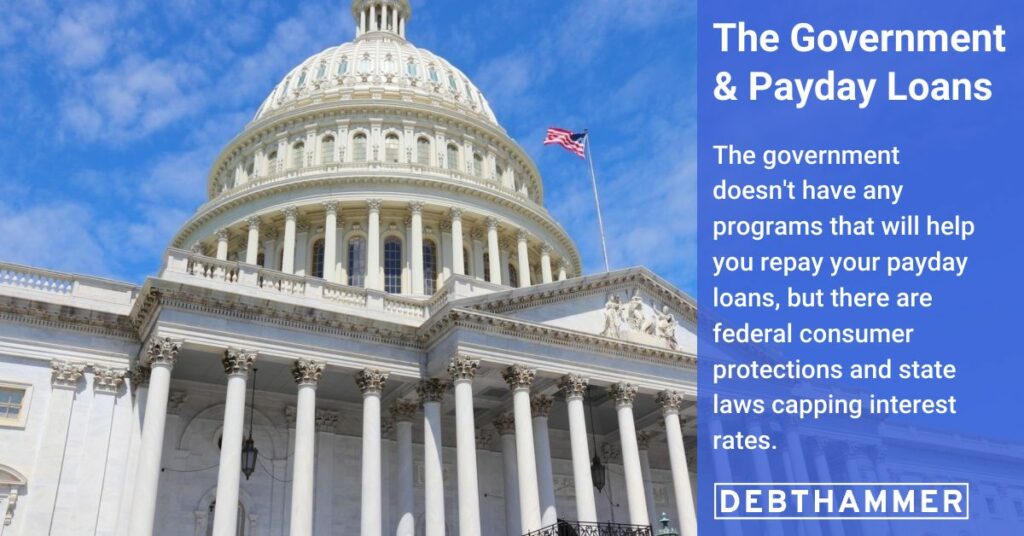One seemingly simple payday loan can leave you grappling with debt for years.
Consider Dave in Missouri, for instance, who borrowed $2,500 over five years and paid $61,000 in interest.
If your payday loan debt has spiraled out of control and you’re wondering whether government help is available, here’s what you need to know.
Table of Contents
Our take
- There are no federal programs to help you get out of payday loan debt
- Some states offer payday loan protections, but there are no laws that help you repay your debt
- The federal government has two agencies to help protect payday loan borrowers: The Consumer Financial Protection Bureau and the Federal Trade Commission
- There are also two federal laws, the Fair Debt Collection Practices Act and the Truth in Lending Act, that help to protect your rights
Stuck in payday debt?
DebtHammer may be able to help.
The federal government does not help with payday loan repayment
If you want to know whether the government will help you pay off your payday loans, the answer is no. The government can’t help you pay off your loan through a forgiveness program or grant.
For years, the federal government has been looking for ways to limit payday lenders to end the debt cycle by curtailing interest rates and protecting borrowers from predatory lending practices. However, the results have not been particularly successful.
Some state governments heavily regulate payday lending
State governments also won’t repay your payday loans, but some states have laws to limit the damage. Payday loans are banned altogether in several states and Washington, D.C. Others cap the annual percentage rates and fees that lenders can charge. Check the payday loan laws in your state to see if your loan is legal. You may not be required to repay a loan that does not comply with state laws or was issued by an unlicensed lender.
However, state laws are unlikely to help you much if your loan is through a tribal lender.
Because the U.S. Constitution recognizes Indian reservations as sovereign nations, the companies offering tribal loans are subject only to tribal and federal regulations on payday loans. That means they can sidestep state laws, which can be a big disadvantage for borrowers — especially those who live in states with robust consumer protections.
Even states with lax restrictions have some guidelines.
For instance, in Texas, which has virtually no payday lending restrictions, payday lenders must be licensed, the maximum loan amount is capped at 20% of the borrower’s gross monthly income and the loans cannot be rolled over more than three times. In addition, many of Texas’ largest cities have implemented their own restrictions on payday lenders.
And every state has a regulatory agency that monitors lending.
Contact your state banking regulator or state attorney general’s office if you aren’t sure whether your loan was legal.
Federal agencies that help with payday loans
As we’ve explained, the federal government won’t help you repay your payday loans, and there are no forgiveness programs available. However, there are some government agencies and federal laws that help protect you from predatory loans and aggressive debt collection efforts.
The Consumer Financial Protection Bureau (CFPB)
The Consumer Financial Protection Bureau was established in 2010 to protect people from predatory lenders after the 2008 economic downturn.
The CFPB has taken many steps to try to reign in payday lenders. Still, the agency has become mired in partisan politics, implementing various rules and then having them rolled back or undone by a new presidential administration.
2021 ‘rent-a-bank’ crackdown
In a positive development for borrowers, Congress overturned a set of regulations in June 2021 that had been enacted during the Trump administration, allowing payday lenders to skirt state laws that cap payday loan interest rates.
This predatory lending practice is known as a “rent-a-bank” scheme. A loophole allowed a payday lender to partner with a commercial bank chartered by the U.S. Treasury to issue installment loans with rates that exceed state laws. Because a national bank is not based in one state, it is subject to individual state laws.
“State interest rate limits are the simplest way to stop predatory lending, and the [Office of the Comptroller of the Currency] rules would have completely bypassed them,” Lauren Saunders, associate director at the National Consumer Law Center, told The Associated Press.
2019 rollback of rule requiring lenders to ensure borrowers can pay back loans
In a not-so-positive development, an Obama administration rule to require that payday lenders ensure that borrowers have the means to repay their payday loans was rolled back in 2019 by the Trump administration.
The rollback was “a complete dismantling” of important consumer protections finalized in 2017,” according to Alex Horowitz, who has overseen The Pew Charitable Trust’s small-dollar loans research for over ten years.
The future of the CFPB is unclear
The future of the CFPB is currently in the hands of the U.S. Supreme Court, which will hear Consumer Financial Protection Bureau v. Community Financial Services Association during this session. The case challenges the constitutionality of the Bureau’s funding.
The case originated as a challenge to a 2017 “payday lending” rule barring lenders from making multiple attempts to withdraw loan repayments from borrowers’ checking accounts, causing borrowers to rack up overdraft fees and penalties.
The original case was rejected by the U.S. Court of Appeals for the 5th Circuit. However, the appeals court agreed that the way the CFPB’s funding violates the U.S. Constitution’s appropriations clause.
If the Supreme Court finds that the funding mechanism is unconstitutional, no one can predict the outcome, but it likely would mean a big setback for payday loan consumers.
The Federal Trade Commission Bureau of Consumer Protection
The FTC stops unfair, deceptive, and fraudulent business practices by collecting consumer reports and conducting investigations, suing companies and people who break the law, developing rules to maintain a fair marketplace, and educating consumers and businesses about their rights and responsibilities.
The FTC has also taken many law enforcement actions against payday lenders. This includes:
- Engaging in deceptive or unfair advertising and billing practices
- Failing to comply with the disclosure requirements of the Truth In Lending Act
- Violating the Credit Practices Rule’s prohibition against wage assignment clauses in contracts
- Conditioning credit on the preauthorization of electronic fund transfers in violation of the Electronic Fund Transfer Act
- Employing unfair, deceptive, and abusive debt-collection practices
The agency has also been aggressive in challenging the legal status of tribal lenders and their efforts to bypass state laws.
Protection from scammers
The FTC protects us from scams by collecting reports about scammers and businesses that cheat people and sharing them with law enforcement to investigate fraud and eliminate unfair business practices.
The FTC has issued the following reminders for payday loan users to help recognize scams.
- You cannot be arrested for defaulting on a payday loan
- A payday lender can only garnish your wages if they have a court order
- Servicemembers have unique rights under the Military Lending Act
Federal laws that help with payday loans
Fair Debt Collection Practices Act
This law was enacted in 1977 as an amendment to the Consumer Credit Protection Act. It established legal protection for consumers from abusive debt collection practices. It limited the actions of third-party debt collectors attempting to collect the debt by using any false, deceptive or misleading representation.
Pro tip: One way to protect yourself and ensure the rules are enforced is to let debt collectors know you are aware of your rights under the FDCPA. Any violation should be documented and sent to the Federal Trade Commission, the Consumer Financial Protection Bureau, and your state attorney general’s office.
READ MORE: The Fair Debt Collection Practices Act
The Truth in Lending Act
The Truth in Lending Act was enacted into law in 1968 and is implemented by the Federal Reserve Board. TILA requires the lender to disclose the loan costs associated with extending credit, such as annual percentage rate (APR), loan terms, and total cost to the borrower so consumers can comparison shop.
This law protects consumers from lenders and creditors and helps consumers make well-informed decisions and terminate unfavorable contracts.
Debt relief options to avoid payday loans
If you’re stuck in the payday loan debt trap or too many monthly payments gobble up your paycheck, payday loans won’t solve your problems. What you need at that point is debt relief. These options could free up enough of your monthly income that you’ll no longer need payday loans at all.
- Payday loan consolidation programs
- Credit counseling
- Payday Alternative Loans (PALs)
- Cash advance apps
- Credit card cash advance
The bottom line
While payday loans are easy, fast, and convenient to take out in a pinch, they are your worst option. They are riddled with high interest rates and fees, have to pay it back in one lump sum from your next paycheck, are almost impossible to repay as scheduled (about 80% of payday loans have to be rolled over into new loans), and can leave you trapped in a long-term cycle of debt that’s difficult to escape.
Look at more reasonable long-term alternatives, or contact a payday loan relief company (like DebtHammer) for help. Payday loans should always be your last resort.


